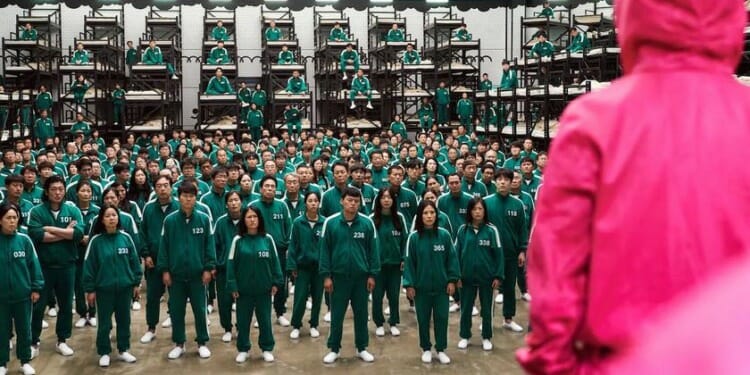“Squid Game” has become Netflix’s most popular show to date after it started on the streaming platform on September 17. It has become the number one program in 94 countries and has crushed Bridgerton as Netflix’s top series.
As of October 19 – a month after launch – 142 million households had watched it, the company said, and, according to closely guarded internal documents uncovered by Bloomberg News, it had generated an estimated $891 million of “impact value” although it isn’t entirely clear what that means. Netflix’s streaming metrics are notoriously a closely guarded secret.
Compare this to the cost of production: The show was reported to have cost just $21.3 million to produce with approximately $2.4 million per episode (there are 9 episodes).
With success, comes the next stage in income revenues: Consumer products based on the show are now on their way to retail, Netflix was quick to announce.
This will make a lot of people happy beyond Netflix, and it has already given a boost to the South Korean textile industry that has been stagnant now for years, suffering from the competition from low-paid fellow Asians (like Vietnam or Bangladesh). The high demand for Squid Game green tracksuits is cheering producers, Reuters reported on October 22 and giving much-needed work to South Koreans.
“October is usually a slow month for the sewing industry, but thanks to Squid Game and Halloween, we are scrambling to stitch,” factory owner Kim jin-ja, 54, told Reuters. “We are now sewing 6,000 teal-green tracksuits for toddlers and children.”
Not everyone however is happy with Halloween costumes inspired by the Squid Game. Many schools in America have resorted to banning the wearing of Squid Game tracksuits as Halloween costumes.
Why? Because even kids want to see the show even though, as Netflix made very clear, this show is for “mature audiences” only. The “Squid Game is rated TV-MA and intended for mature audiences,” a Netflix representative said in a written statement to the Wall Street Journal. “We offer parents a wide variety of parental controls to make the appropriate choices for their families.” Indeed they do, Netflix offers its subscribers a second channel dedicated to children.
So why do children insist on seeing the show? In America, a controversy has arisen as parents are pressured by their kids to let them watch the show. The show’s use of children’s games is probably why kids are so attracted to it and curious to know what all the talk among adults is about.

Why the Squid Game is a success despite its dark and violent plot
And to think that a dark dystopian thriller is the cause of all this roaring success. How could that happen? TechCrunch claims Squid Game has captured the “cultural zeitgeist”. Have we really reached the end of times and now we all enjoy the dramatic depiction of senseless killings?
The plot is deceptively simple and based on something that has been a huge success for decades, at least since the 1990s: Reality shows on television. The depiction of people stuck on an island (or some other constrained situation) competing against each other, vying for attention in order to win prizes. For audiences glued to the screen, this has been a “stellar way to ignore the state of the world and focus on what’s important: other people’s drama”. And root for them.
Why should we root for them? And here is the trick of “reality shows”: They feature people like you and me. Inevitably, empathy builds up – and sympathy is a powerful driver that ensures big audiences. Bottom line, it’s the same feeling that overwhelms crowds watching football or soccer: But for the Grace of God, it could be you, out there on the field, hitting that ball.
The Squid Game hits all the bases. The plot features financially strapped adults playing traditional South Korean children’s games on a secluded island in the hope of winning a cash prize of about $40 million. The losers die, ruthlessly shot down by the game organizer’s “army”. That army is suitably threatening, wearing black masks and dressed in red suits that look suspiciously like hazmat (hazardous materials) suits while the players look like inmates in a prison, dressed in green with white sneakers. And with every death, the cash prize rises.
In other words, a reality show contest that ends in death for every contestant except the winner. And the winner (spoiler alert) is a really nice guy with a big smile and a born optimist, you can’t help but like him. Yet he’s no great shakes, he’s an average Joe (Korean-style) who’s divorced but loves his kid, who tries (every once in a while) to work but can’t hold a job, who’s a dead weight on his poor hard-working Mom who runs a stall in the market. He even steals her savings and goes gambling, obviously always losing.
He and all the people who participate in the Squid Game have equally sad, dismal backgrounds, they are all the children of income inequality. People who could have belonged to the middle class but have all fallen on hard times and don’t seem to be able to get out of their rut. And this is, of course, what makes for the Squid Game’s universal appeal: The working classes suffer from the rise of the ultra-rich not just in South Korea but everywhere. So large audiences recognize themselves in the main characters’ sad saga and understand the lure of the game – and the prize.
Another big boost to success are the actors themselves, attractive, open and easy to sympathize with:
Yes, the prize is like a lottery. Who will win? Who will survive all the obstacles put in their way by those children’s games that are incredibly vicious and deadly? How can anyone look away and stop following the story? Every episode is a new game. And the last one is the most terrifying, it brings out the worst in every remaining (by then, very few) participants, any attempts at collaboration and helping each other out is now forgotten. And just as it looked like the participants had (finally!) found a way to win that game, the organizers turn the tables on them. As you might expect, after all, they are the game’s organizers, they hold the ultimate power.
So yes, this is a story of power, the power of the rich to do as they please, and the poor caught like fish in their nets. As the Wall Street Journal noted in carefully balanced words, the show “examines disparities between the rich and poor”, the widening “wealth gap and capitalism”.
Is the Squid Game a horror show?
That the show is a critique of capitalism was quickly picked up by North Korean propaganda, gleefully pointing out that this was yet another confirmation of capitalism’s ills. According to the North Korean prop website, Arirang Meari, the Squid Game highlights the “sad reality of a beastly South Korean society” that adheres to the “law of the jungle”. And if the “Squid Game is popular, it’s because it exposes the reality of South Korean capitalist culture” – in short, “a world where only money matters—a hell-like horror.”
That, of course, is highly reductive, the Squid Game is much more than a simple horror show. As I argued above, the Squid Game is a highly successful fictionalized reality show. And what makes the “Squid Game” so fascinating to watch is the deeply human elements in the show, as deep empathy is established between the viewer and the show’s main actors. That empathy is universal because of the themes addressed – friendship, family, adversity, ill fate, hope for a better life – and it transcends the boundaries between generations.
So should you watch it? Disclosure: I did and enjoyed it from start to finish. The pacing is fast, never letting you off, the camera work is flawless, the setting manages to surprise, the games are intriguing and suspenseful, the actors are good, their game is natural. Of course, there is a lot of gore and blood and violence, this is certainly not for kids.
Will there be a second season? With such a blockbuster, it’s a given. On October 25, Netflix released the trailer for season 2 planned for next year:
The main character played by Lee Jung-jae, as you can see, sporting red hair now has decided to investigate the game’s organizers – uncovering for us who they are. Who will resist the lure? Whether the second season will be as good as the first is an open question, but you can bet millions will rush back to their screen to watch it.
Editor’s Note: The opinions expressed here by Impakter.com columnists are their own, not those of Impakter.com. — In the Featured Photo: Squid Game participants Source: Netflix










